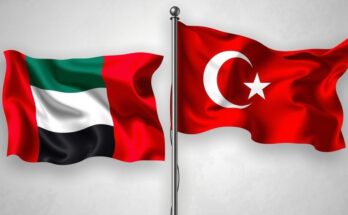Tensions between Somalia and Ethiopia have escalated following the expulsion of Ethiopian diplomat Ali Mohamed Adan by Somalia for alleged interference in its internal affairs. This incident is part of a larger trend of diplomatic disputes and regional alliances, with Somalia bolstering security cooperation with Egypt and Turkey in reaction to Ethiopian engagements with semi-autonomous regions. The historical context includes Ethiopia’s contentious relationships surrounding the Nile River, further complicating the geopolitical dynamics in the Horn of Africa.
The recent diplomatic rift between Somalia and Ethiopia has been further exacerbated by the expulsion of a senior Ethiopian diplomat, Ali Mohamed Adan, who was declared persona non grata by Somalia’s Foreign Ministry. The ministry accused him of engaging in actions that are inconsistent with his diplomatic role and violating the Vienna Convention on Diplomatic Relations. This incident is part of a larger pattern of escalating tensions, with Somalia having previously expelled Ethiopia’s ambassador and shut down its consulates in regions such as Puntland and Somaliland due to alleged interference in its internal affairs. The tensions escalated after Ethiopia’s recent agreements with Puntland and Somaliland, both of which have sought to distance themselves from the Somali federal government. Somalia’s concerns stem from allegations that Ethiopia has been providing unauthorized arms shipments to Puntland, in addition to a controversial military agreement with Somaliland, which seeks international recognition. In response to Ethiopia’s actions, Somalia has sought to enhance its security cooperation with regional players including Egypt and Turkey. Egypt’s involvement includes military support and a defense pact, reflecting its longstanding tensions with Ethiopia over the Grand Ethiopian Renaissance Dam (GERD). As these diplomatic and military maneuvers unfold, the dynamics of the Horn of Africa continue to evolve, with Somalia fortifying its alliances amidst perceived threats to its sovereignty from Ethiopia.
The backdrop of this escalating rift between Somalia and Ethiopia lies in a series of political and diplomatic conflicts that have developed over recent months. The core issue centers around alleged Ethiopian interference in Somalia’s internal governance, particularly following Ethiopia’s partnerships with semi-autonomous regions like Puntland and Somaliland. These agreements have raised concerns in Mogadishu regarding Ethiopia’s intentions and the potential infringement upon Somalia’s sovereignty. The historical context of these tensions also includes Ethiopia’s long-standing conflicts with neighboring states over water resource management, particularly concerning the Nile River, which has placed Egypt and other nations into the intricate dynamics of the Horn of Africa.
The intensifying rift between Somalia and Ethiopia highlights the fragile nature of diplomatic relations in the region, characterized by allegations of interference, military agreements with breakaway regions, and growing international alignments. Somalia’s expulsion of Ethiopian diplomats underscores its resolve to assert sovereignty, while simultaneously seeking alliances with nations like Egypt and Turkey to counterbalance Ethiopia’s influence. As these developments unfold, the geopolitical landscape of the Horn of Africa continues to shift, warranting careful observation from stakeholders in the international community.
Original Source: www.al-monitor.com




